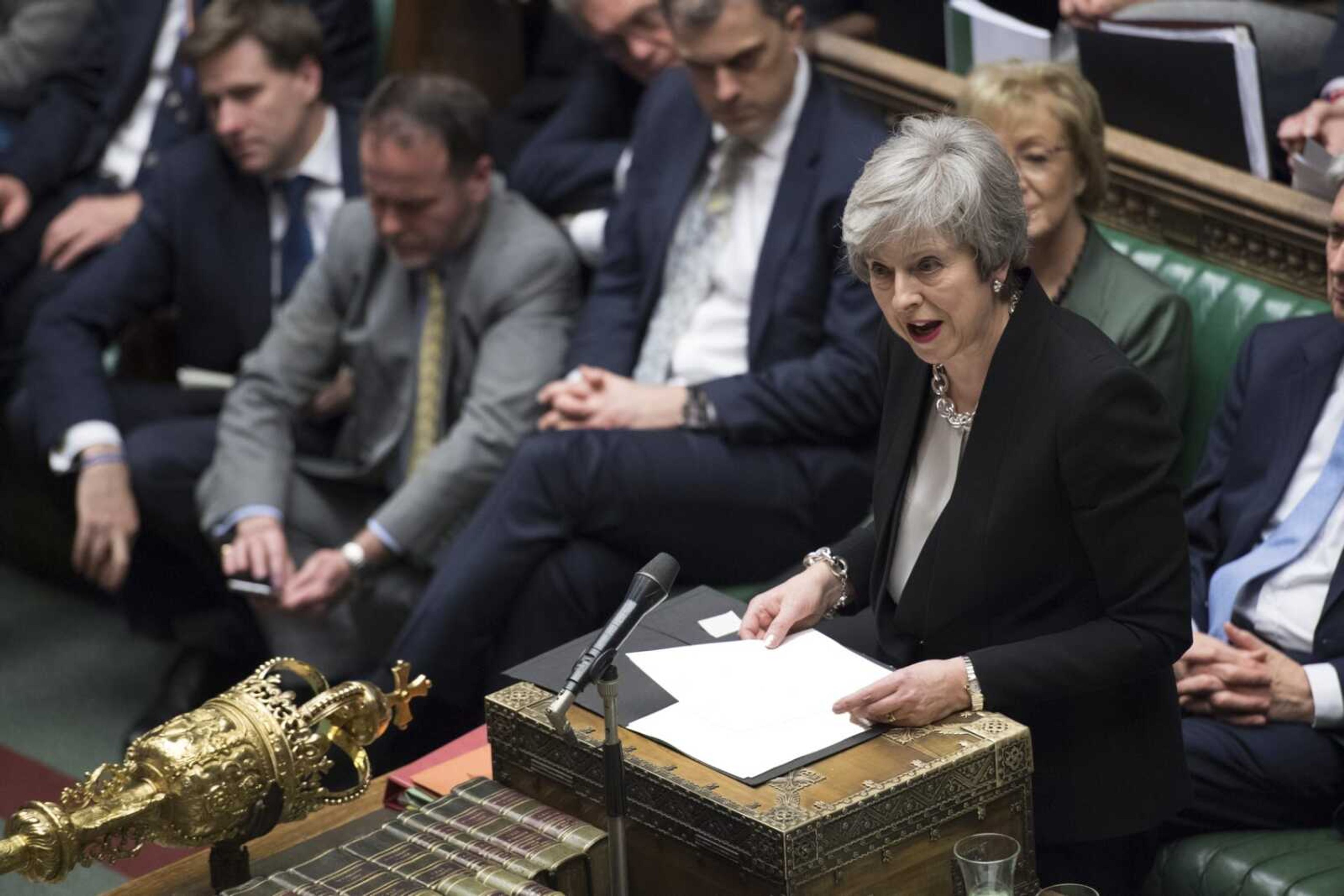U.K. leader seeks Brexit deal changes; EU stands firm
LONDON -- British Prime Minister Theresa May on Tuesday won a few weeks to salvage a Brexit deal but headed toward a clash with the European Union by promising to overhaul the divorce agreement she spent a year and a half negotiating with the bloc. Trying to break the U.K.'s Brexit deadlock, May got Parliament's backing for a bid to rework an Irish border guarantee in the withdrawal deal -- a provision May and the EU both approved, and which the bloc insists cannot be changed...
LONDON -- British Prime Minister Theresa May on Tuesday won a few weeks to salvage a Brexit deal but headed toward a clash with the European Union by promising to overhaul the divorce agreement she spent a year and a half negotiating with the bloc.
Trying to break the U.K.'s Brexit deadlock, May got Parliament's backing for a bid to rework an Irish border guarantee in the withdrawal deal -- a provision May and the EU both approved, and which the bloc insists cannot be changed.
"It is now clear that there is a route that can secure a substantial and sustainable majority in this House for leaving the EU with a deal," she said, promising to "obtain legally binding changes to the withdrawal agreement" from the EU.
The EU immediately ruled that out, insisting in a statement the current deal with the U.K. remained the "best and only way" to achieve an orderly Brexit. French President Emmanuel Macron said the agreement "is the best accord possible. It is not re-negotiable." Guy Verhofstadt, the top Brexit official at the European Parliament, said there was "no majority to reopen or dilute" the deal.
It was the latest disorienting chapter in a Brexit process increasingly surreal since Parliament rejected May's divorce deal two weeks ago, leaving Britain lurching toward a cliff-edge no-deal" departure from the bloc March 29.
A series of Commons votes Tuesday on next steps submitted by both pro-Brexit and pro-EU legislators ended up sending starkly mixed signals, as lawmakers backed a call to renegotiate the deal and also approved a rival motion ruling out a no-deal exit.
May had urged lawmakers to "send an emphatic message" to the EU, but their response is likely to leave the bloc even more confused about British aims.
May believes her agreement can still win Parliament's backing if it is changed to alleviate concerns about the Irish border measure, known as the backstop. The backstop would keep the U.K. in a customs union with the EU in order to remove the need for checks along the border between the U.K.'s Northern Ireland and EU member Ireland after Britain leaves the bloc.
The border is crucial to the divorce deal because it will be the only land frontier between the U.K. and the EU after Brexit and because the free flow of people and goods underpins the local economy and Northern Ireland's peace process.
Opposition to the backstop by pro-Brexit lawmakers -- who fear it will trap Britain in regulatory lockstep with the EU -- helped sink May's deal Jan. 15, when Parliament rejected it in a 432 to 202 vote.
On Tuesday, Parliament backed, by 317 votes to 301 votes, a call for the border measure to be replaced by unspecified "alternative arrangements." Leading Brexiteers praised the result. Former Foreign Secretary Boris Johnson said Parliament had sent a "clear, unambiguous" message the backstop had to be removed.
"I hope that our friends in Brussels will listen and that they will make that change," he said.
But Green Party legislator Caroline Lucas, who wants a new referendum on Britain's EU membership accused May of chasing "heated-up fantasies that have already been rejected by the EU."
May acknowledged the EU had "limited appetite" for changing the Brexit deal. But she vowed to go to Brussels and seek "significant and legally binding change" to the backstop. May's office said that might include an end date to ensure it is temporary or an exit clause for Britain. Both those ideas have been repeatedly rejected by the EU.
"There can be no change to the backstop," said Ireland's European Affairs Minister, Helen McEntee. "It was negotiated over 18 months with the U.K. and by the U.K."
Connect with the Southeast Missourian Newsroom:
For corrections to this story or other insights for the editor, click here. To submit a letter to the editor, click here. To learn about the Southeast Missourian’s AI Policy, click here.









